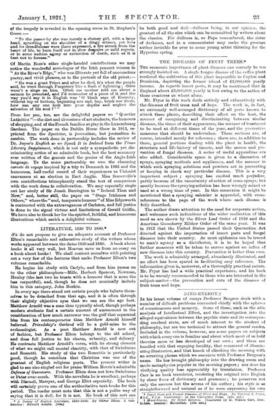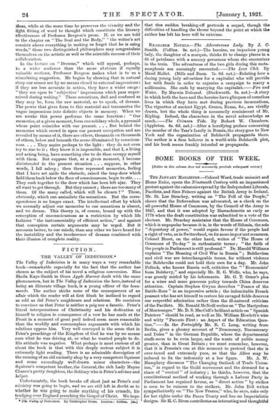MIND-ENERGY. t In his latest volume of essays Professor Bergson
deals with a number of difficult problems connected chiefly with the spheres of consciousness and memory. Some of these, such as the able analysis of Intellectual Effort, and the investigation into the alleged equivalence between the psychic state and its correspon- ding cerebral state, are of much interest to the student of philosophy, but are too technical to attract the general reader. Included in the volume, however, are some papers on subjects withwhich everyone is familiar and about which most of us hold theories more or less developed of our own ; and these are handled with that engaging lucidity, that command of illumin- ating illustration, and that knack of clinching the meaning with an arresting phrase which we associate with Professor Bergson's name. He has brought philosophy into the drawing room and made metaphysics popular in the morning papers ; nor does his vivifying quality lose appreciably by translation. Professor Carr is no hack translator, rendering the original into English by sheer force of dictionary and grammar ; he preserves not only the essence but the aroma of his author ; his style is as straightforward and natural as if he were expressing his own
• Insect Pests and Fungal Diseases of Fruit and Hops. By Percival J. Pryer, 7.1.0.. F.C.B. Cambridge : at the University Press. [45s. net.]
t Mind-Energy. By Henri Bergson. Translated by H. Wildon Carr. lion. D.LUL London: Macmillan. Ilia, net.] Ideas, while at the same time he preserves the vivacity and the Eight fitting of word to thought which constitute the literary bffectiveness of Professor Bergson's prose. If, as we are told in the chapter on " The Soul and the Body," " the writer's art consists above everything in making us forget that he is using words," these two distinguished philosophers may congratulate themselves on the artistic as well as the scientific success of their collaboration.
In the lecture on " Dreams," which will appeal, perhaps, to a wider audience than the more abstruse if equally valuable sections, Professor Bergson makes what is to us a stimulating suggestion. He begins by showing that in natural sleep our senses are by no means closed to external impressions ; if they are less accurate in action, they have a wider range : "they are open to ' subjective ' impressions which pass unper- ceived during waking." These sensations, dull and confused as they may be, form the raw material, so to speak, of dreams. The power that gives form to this material and transmutes the vague impressions into definite objects is memory. When we are awake this power performs the same function : " Our memories, at a given moment, form one solidary whole, a pyramid whose point coincides with our present. . . . But behind the memories which crowd in upon our present occupation and are revealed by means of it, there are others, thousands on thousands of others, below and beneath the scene illuminated by conscious- ness. . . . They aspire perhaps to the light : they do not even try to rise to it ; they know it is impossible, and that I, a living and acting being, have something else to do than occupy myself with them. But suppose that, at a given moment, I become disinterested in the present situation . . . suppose, in other words, I fall asleep ; then these repressed memories, feeling that I have set aside the obstacle, raised the trap-door which held them back below the floor of consciousness, begin to stir... . They rush together to the door which has been left ajar. They all want to get through. But they cannot ; there are too many of them. Of the many called, which will be chosen ? " Those, obviously, which can assimilate the sensations. But the corre- spondence is no longer exact. The intellectual effort by which we normally adjust our memories to our sensations is absent, and we dream. This theory is, of course, bound up with the conception of unconsciousness as a restriction by which life fashions " the instrumentality of efficient action," and against that conception certain arguments may be urged. But it accounts better, to our minds, than any other we have heard for the instability and the incoherence of dreams combined with their illusion of complete reality.











































 Previous page
Previous page